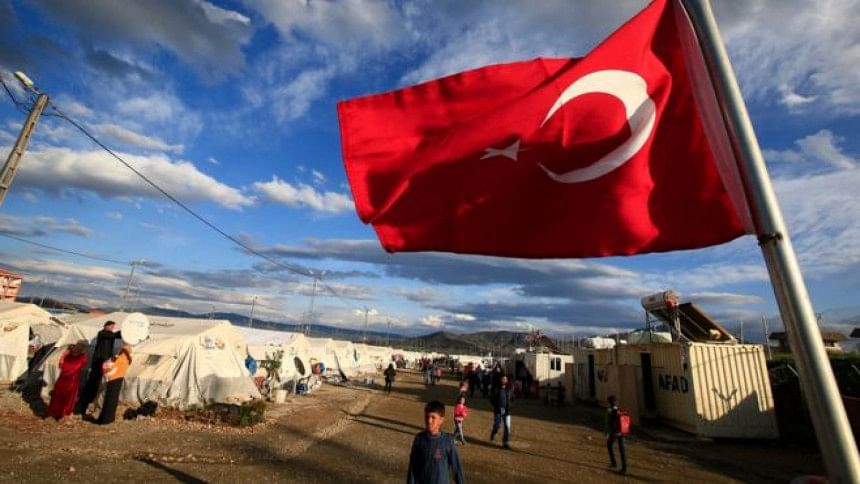Merkel, EU officials heading to Turkey to promote migrant deal

German Chancellor Angela Merkel and top EU officials are due to visit the Turkish-Syrian border to promote a controversial month-old migrant deal.
The visit comes amid questions over the legality of the EU-Turkey pact, which deports back to Turkey migrants who do not qualify for asylum in Greece.
Human rights groups say Turkey is not a safe place to return people.
Turkish officials have warned the deal could collapse if demands for visa-free EU travel for its citizens are not met.
Merkel is due to visit a refugee camp in the southern city of Gaziantep, near the Syrian border, where she will meet Turkey's Prime Minister, Ahmet Davutoglu.
She will travel with the European Council President, Donald Tusk, and the EU Commission Vice President, Frans Timmermans.
Merkel has faced opposition in Germany for her migration policies and has defended the deal with Turkey despite opposition from some European partners.
Her trip comes as she faces additional pressure for agreeing to the prosecution of a German comedian accused of insulting the Turkish President, Recep Tayyip Erdogan.
Advocates of freedom of speech in both Turkey and Germany have called on Merkel to send out a strong message on the issue during her visit.
It has been over a month now since the migrant deal between the EU and Turkey was struck, but not everyone is convinced that it is working smoothly.
Although the number of migrants reaching Greece from Turkey has dropped by around 80%, few EU experts have arrived in the field, and many EU nations are dragging their feet to accept more migrants in.
Angela Merkel said the aim of the visit was to see the living conditions of migrants in Turkey.
But more will be on the table, such as the promise of visa-free travel for Turkish citizens willing to go to Europe, which seems to be one of the most contentious issues.
The goal of the EU-Turkey deal is to deter migrants, mainly Syrians and Iraqis, from making the crossing between Turkey and Greece.
Under the agreement, migrants who have arrived illegally in Greece since 20 March are expected to be sent back to Turkey if they do not apply for asylum or if their claim is rejected.
For each Syrian migrant returned to Turkey, the EU is due to take in another Syrian who has made a legitimate request.
The scheme has reduced sharply the number of arrivals, from more than 56,000 in February to around 7,800 over the past 30 days, according to the European Commission.
However, the International Organization of Migration said unofficial data for arrivals in Greece in recent days suggested the numbers were picking up again.
And the promised relocation to EU countries seems to be slow as nations are reluctant to take in more migrants - 103 Syrians have been resettled from Turkey to Europe, the Commission said.
Moreover, few EU experts have arrived to help enforce the agreement.
Rights organisations have attacked the scheme, with Amnesty International saying that Turkey has illegally returned Syrians to their country, a charge Ankara denies.
The EU has pledged up to $6.8bn (£4.5bn) in aid to Turkey over the next four years.
Ankara, however, expects more, including visa liberalisation, a point in which faces opposition of some EU members.
"If the European Union does not take the steps it needs to take, if it does not fulfil its pledges, then Turkey won't implement this agreement,'' Erdogan said earlier this month.
The agreement says that Turkey must meet 72 conditions by 4 May to earn the visa waiver, but diplomats say only half of those points have been met so far.
Turkey already hosts some 2.7 million Syrian refugees, at a cost of over $10bn (£7bn), the government says.

 For all latest news, follow The Daily Star's Google News channel.
For all latest news, follow The Daily Star's Google News channel. 








Comments